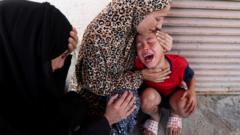Nasser Medical Complex, Gaza's largest operating hospital, faces imminent disaster due to a severe fuel shortage, exacerbated by escalating Israeli military operations in Khan Younis. Medical staff report that without immediate assistance, many patients in intensive care could face dire consequences.
Gaza's Nasser Hospital on Brink of Collapse as Conflict Escalates

Gaza's Nasser Hospital on Brink of Collapse as Conflict Escalates
Critical fuel shortages and military offensives put lives at risk in the largest hospital in Gaza.
Gaza's Nasser Medical Complex is teetering on the edge of a catastrophe as doctors issue dire warnings over severe fuel shortages and a growing Israeli military presence in the area. The hospital, which has been a critical lifeline for countless patients, announced on Thursday that it could no longer accept new admissions. Local sources report that Israeli troops and tanks advanced dangerously close to the hospital, leading to fears among medical staff and patients alike.
The advancing forces were seen operating mere meters from the medical facility, reportedly engaging in combat nearby, which has caused anxiety for those within its walls. Despite the escalated threats, doctors and patients remain trapped, sending messages about their fearful situation: “We are closer to death than to life,” they shared with journalists.
As of Friday morning, reports indicated that Israeli tanks had retreated slightly, leaving behind signs of destruction—burned tents and crushed vehicles littered the landscape surrounding the hospital. Medical personnel have warned that without fuel, power for critical equipment could fail, endangering the lives of patients reliant on ventilators.
While the Israeli military claimed that supplies of fuel had entered Gaza, hospital officials reveal that distribution remains an issue. With a lack of essential medical supplies—especially trauma-related resources—the hospital, which usually accommodates 350 patients, is currently overwhelmed, treating around 700.
A week ago, a representative from the World Health Organization (WHO) criticized the situation as “one massive trauma ward,” detailing the despair faced by medical staff who are working round the clock, overwhelmed by the ongoing casualties.
This dire state has been worsened by recent violent events: ten people seeking aid were reportedly killed near Rafah due to Israeli military actions, underscoring the continuing dangers faced by civilians.
Further complicating the situation, a senior Hamas military commander was killed in an airstrike in Jabalia, illustrating the unrelenting violence in the region. As efforts for a ceasefire have reached a standstill amidst ongoing negotiations, the future remains uncertain, with many in Gaza anxiously awaiting a resolution to the escalating crisis. Despite Israel's Prime Minister hinting at a potential ceasefire, significant obstacles remain regarding aid distribution and military withdrawal, leaving thousands in precarious situations.





















